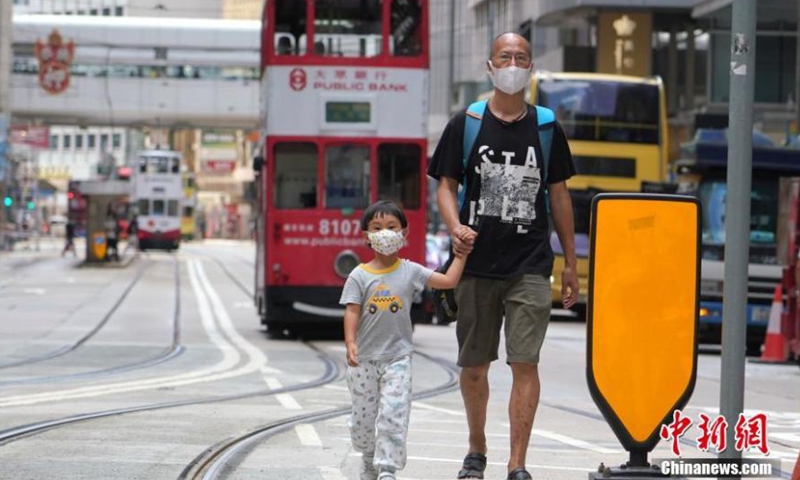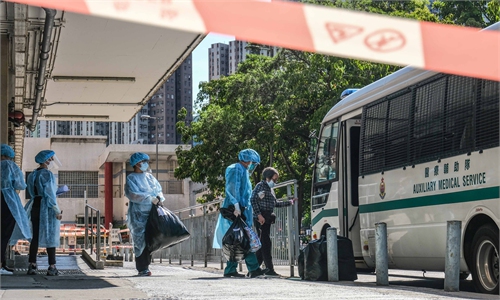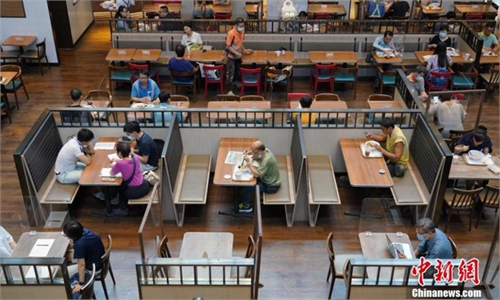Hong Kong’s GDP estimated to have shrunk 9% in Q2
Urgent to contain virus as annual economy forecast to shrink up to 5%

A man and a kid wearing masks walk in the Central area of Hong Kong, south China, July 27, 2020. Hong Kong announced further tightening of anti-epidemic measures, including prohibition of dining-in services in restaurants and mandatory mask-wearing in all public places, which will come into effect on Wednesday.Photo:China News Service
Advance estimates showed Wednesday that the Hong Kong Special Administrative Region (HKSAR)'s GDP contracted 9.0 percent year-on-year in the second quarter of 2020, reflecting a slow and bumpy recovery amid a local recurrence of COVID-19 cases and external challenges.
According to data from the HKSAR Census and Statistics Department, the city's GDP decreased by 9.0 percent in the second quarter, compared with a decrease of 9.1 percent from January to March, citing continued weak performance in both domestic and external demand.
Among the major drivers of GDP growth, the city's private consumption expenditure decreased 14.5 percent in the second quarter, deteriorating from the 10.6 percent decline from January to March.
Given the below-expectation performance, analysts hold a gloomy outlook on the city's economy for the rest of the year, especially with a new wave of COVID-19 infections surging there.
Liang Haiming, chairman of the China Silk Road iValley Research Institute, told the Global Times Wednesday that Hong Kong's economy is expected to shrink 1.5-5 percent for the whole year. "It will be hard for the economy to see a fast recovery because a prolonged coronavirus outbreak threatens retail and tourism, while rising unemployment impacts residents' consumption."
"The most important task for Hong Kong right now is to contain the spread of COVID-19," Liu Guohong, director of the Shenzhen-based Department of Finance and Modern Industries at the China Development Institute, told the Global Times Wednesday.
Vincent Wing Shun Cheng, Hong Kong Legislative Councillor, told the Global Times Wednesday that bringing the pandemic situation under control is a consensus held by both the Hong Kong government and most residents.
Last week, the HKSAR government tightened anti-epidemic measures. Restaurants are not allowed to provide dine-in services, and some premises have to shut down temporarily. Hong Kong Disneyland Resort suspended operations again from July 15 and Ocean Park from July 14, less than a month after their resumption in mid-June.
HKSAR Financial Secretary Paul Chan Mo-po wrote in a blog post Sunday of the need to strike a balance between epidemic control efforts and economic recovery. He called for local residents to contribute to the fight against the outbreak, while calling for landlords to reduce rents to help shops, restaurants and other small- and medium-size enterprises to tide over difficulty times.
The latest data shows that Hong Kong's unemployment rate reached a new high of 6.2 percent between April and June.
To ease unemployment, the Hong Kong government launched an Employment Support Scheme, providing wage subsidies totaling about HK$7.7 billion and committed to maintaining payments to more than 330,000 people during the subsidy period.
In the future, Hong Kong would rely more on the Guangdong-Hong Kong-Macao Greater Bay Area, the Belt and Road Initiative as well as Hainan free trade port to help recover local economy, Liang said.
"The HKSAR government should further increase fixed-asset investment, especially attracting the listings and investment of internet and innovation firms," Liang said, noting that favorable policies should be rolled out to reform Hong Kong's economic structure to boost the development of the new economy.
Thanks to the fast recovery of the Chinese mainland economy in the second quarter, Hong Kong's merchandise exports were greatly restored in the second quarter, partly offsetting the free fall in global demand. The city's year-on-year decline in the volume of merchandise exports narrowed from 9.1 percent in the first quarter to 1.3 percent in June.
Cheng said that he hopes that once the outbreak is largely put under control in Hong Kong, authorities will roll out a local version of the health code that is mutually recognized with that operating in the mainland so as to promote cross-border people exchanges for a faster economic recovery.


